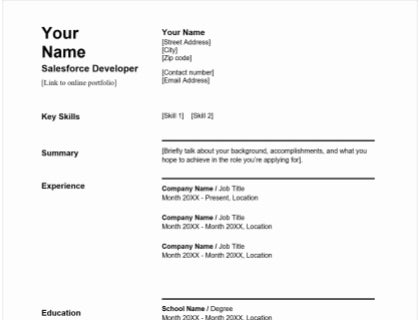
Salesforce Developer Resume Free Template Download
Download this Salesforce developer resume template in Microsoft Word format.
Download NowSalesforce Developer Resume Example:
Your Name
Salesforce Developer
[Link to online portfolio / website / LinkedIn profile]
[Street address]
[City]
[Zip code]
[Contact number]
[Email address]
Summary:
[Briefly talk about your background, skills, and qualifications.]
Key Salesforce Skills:
[Skill 1]
[Skill 2]
Experience:
Company Name / Job Title Month 20XX - Present, Location
Company Name / Job Title Month 20XX - Month 20XX, Location
Company Name / Job Title Month 20XX - Month 20XX, Location
Education:
School Name / Degree Month 20XX - Month 20XX, Location
School Name / Degree Month 20XX - Month 20XX, Location
Certification:
[Salesforce Certification 1]
[Certification 2]
Notable Achievements:
[Achievement 1]
[Achievement 2]
Awards and Promotions:
[Award 1]
[Job promotion 1]
How to Write a Salesforce Developer Resume:

A complete guide to writing a professional Salesforce developer resume.
Start with a summary.
Make your summary stand out.

You'd need your summary to create a great first impression, intriguing employers enough to continue reading your resume. Start by showcasing your most desirable qualities including your skills, years of experience, and top achievements.
Keep your summary short and to the point.

Aim to keep your summary under four sentences and only include the most important information. Add a sentence about how your specific skill set and experience will benefit the employer's organization.
Showcase your Salesforce skills.
Start with your most important skills.

Your core Salesforce developer skills such as proficiency with JavaScript, Apex, and Visualforce, mobile and web development, or data modeling and security should be mentioned first.
Be sure to mention all relevant skills that could set you apart from other candidates.
Match your skillset with the job posting.
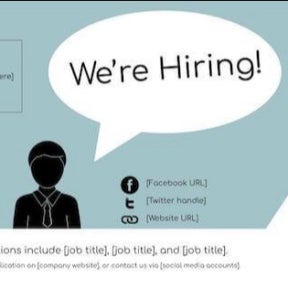
You'll want to list all relevant skills and competencies you have acquired over time. Directly match your skills with the job requirements and do not list skills that will not be needed for the position.
Be truthful.

When listing your skills, remain honest about your level of expertise as the hiring process may require practical assessments.
Add your experience.
List your experience in reverse chronological order.

The work experience section is a crucial part of your resume as employers will want to read about the Salesforce projects and tasks you've completed in previous roles. You'll want to start this section with your most recent position.
Add the places you have worked.
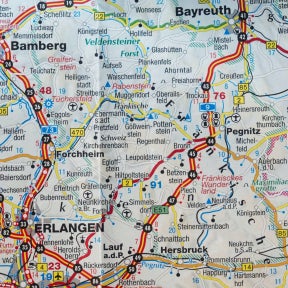
Be sure to pay special attention to the responsibilities involved with each previous job. This will help employers envisage you in the role and determine the type of tasks you're knowledgeable in.
List your education information.
Highlight your qualifications.

In reverse chronological order, add your qualifications. Each qualification entry should mention an institution name, the dates of attendance, and a location.
Mention qualifications in progress.

If you're studying towards a qualification, place it at the start of this section. Omit the initial date and instead include the words "In Progress."
Include your certifications.
List any relevant certificates.

While your portfolio of projects already says a lot about you and your abilities, to help improve your chances of an interview, remember to explicitly mention any relevant Salesforce certifications, even if not required.
Start with your most relevant certificate.

If you obtained more than one certificate, consider which one employers would be most interested in and mention it first.
Common certificates related to Salesforce developers include:
- Salesforce Certified Developer.
- Salesforce Platform Developer.
- Salesforce Platform App Builder.
- Salesforce Marketing Cloud Administrator.
Add certification details.
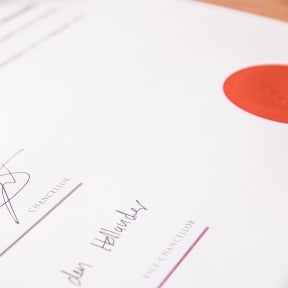
Salesforce accredited certificates indicate to employers that you have formal training and that you're passionate about your job. Be sure to mention the institution and the date you obtained your certification.
Highlight your career achievements.
Add career highlights.

Your career milestones are a great addition to your resume because they act as solid references, proving to employers that you're more than capable of exceeding their expectations.
You'll immediately want to capture an employer's attention, so start this section with your most notable Salesforce projects.
Include major completed projects.

You'll want to provide sufficient details, for example, introducing new features to a Salesforce application that boosted engagement, designing system code and configurations, developing technical design documentation, as well as being responsible for data modeling, management, and security.
Add any awards and job promotions.
Showcase key career moments at the end of your resume.
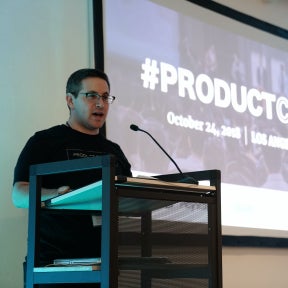
These typically include professional achievements such as awards or job promotions that may be of particular interest to employers.
Provide the details of your key accomplishments.

Use bullet points to briefly describe each award or job promotion and list them in reverse chronological order. Remember that each entry should also identify the institution/employer and don't neglect to provide a date.
What Employers Look for in a Salesforce Developer Resume:
- A well-defined skillset and list of programming languages you have proficiency with. Popular languages for Salesforce developers are Apex, Visualforce, Java, JavaScript, HTML, and more.
- An analytic mindset with good problem-solving ability.
- Working as part of a team and with different departments, including front-end developers, database administrators, and more.
- Excellent communication skills.
- A history of working under pressure to meet deadlines.
- A relevant degree in computer science or a certificate in Salesforce Development will help you.
- A link to an online portfolio of work that demonstrates a wide range of web and mobile application projects.


